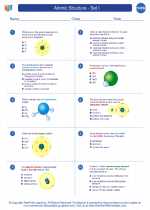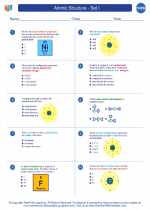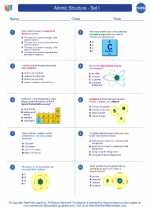Work in Chemistry
In the context of chemistry, work refers to the energy transferred when a force causes an object to move. In chemical reactions, work can be done when substances are mixed, heated, or compressed. Work is an important concept in understanding processes such as expansion of gases, changes in volume, and other physical transformations.
Calculating Work
The work done in a chemical process can be calculated using the formula:
Work (W) = Force (F) * Distance (d) * cos(θ)
Where: - W is the work done - F is the force applied - d is the distance over which the force is applied - θ is the angle between the force and the direction of motion
Units of Work
The SI unit of work is the joule (J), where 1 joule is equal to 1 newton meter. In chemistry, work is often measured in joules or sometimes in kilojoules (1 kJ = 1000 J).
Application in Chemistry
Understanding work is crucial in various chemical processes, such as: - Expansion or compression of gases - Stirring or mixing substances - Heat transfer in reactions - Changes in volume and pressure
Study Guide
To master the concept of work in chemistry, here are some key points to focus on:
- Understand the definition of work in the context of chemistry.
- Be able to calculate work using the formula W = F * d * cos(θ).
- Practice converting units of work (joules to kilojoules and vice versa).
- Explore real-life examples and applications of work in chemical processes.
- Review and solve problems related to work in chemistry, such as gas expansion or compression.
By mastering the concept of work in chemistry, you'll be better equipped to understand and analyze various chemical reactions and processes.
[Work] Related Worksheets and Study Guides:
.◂Chemistry Worksheets and Study Guides High School. Atomic Structure - Set I

 Worksheet/Answer key
Worksheet/Answer key
 Worksheet/Answer key
Worksheet/Answer key
